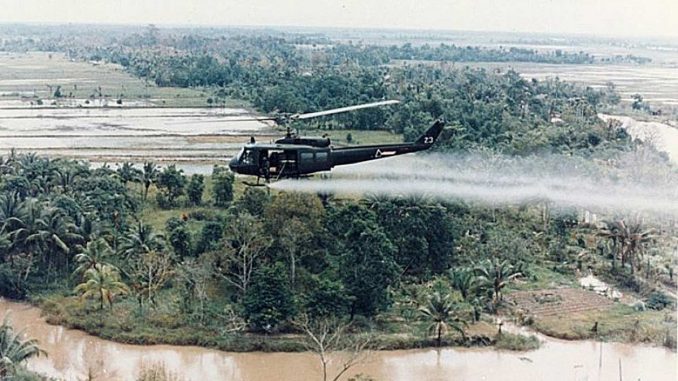

New research could help Vietnam-era veterans who served in Guam and who have diseases linked to Agent Orange file for disability with the Department of Veterans Affairs.
Two veterans advocacy groups published a policy paper Monday saying that veterans who served on Guam between 1962 and 1975 likely were exposed to herbicides disposed of on the Pacific island or used for vegetation control.
The groups — the National Veterans Legal Services Program and the Jerome Frank Legal Services Organization at Yale Law School — say their link meets the VA’s legal criteria for awarding affected veterans Agent Orange-related benefits.
Related: VA Releases Updated List of Agent Orange Exposure Locations
“We conclude that existing evidence establishes that it is, at the very least, ‘as likely as not’ that veterans who served in Guam from 1962 to 1975 were exposed to Agent Orange and other dioxin-containing herbicides,” wrote NVLSP Executive Director Bart Stichman and several law students and attorneys.
Tens of thousands of U.S. service members were assigned to Guam during the Vietnam War, where three quarters of all U.S. B-52 bombers used in the air campaign were based. Former service members reported spraying defoliants on vegetation to reduce fire hazards and burying hazardous waste, including Agent Orange, in landfills and low-lying areas near the ocean.
A 2018 Government Accountability Office report concluded, however, that in the absence of records — including those that were incomplete or have been lost — and without credible soil samples, exposure could not be conclusively proven or disproven.
For veterans who served outside Vietnam to receive VA disability compensation or health services for the 14 health conditions determined to be linked to herbicide exposure by the department, they must prove they have an Agent Orange-related illness, connect it to their military service and provide support for a causal link.
Some veterans who served on Guam have been awarded disability claims for Agent Orange-related illnesses, but NVLSP and Yale believe all who served on Guam during the Vietnam era who have a presumptive condition should automatically qualify for VA benefits.
“Individual veterans should not be penalized for an incomplete evidentiary record when [the Department of Defense] has failed to maintain this record, or to resolve and refute extensive claims of Agent Orange and other toxic herbicide exposure,” they wrote.
In January, the DoD released a list of locations outside Vietnam where herbicides were tested or stored, but the list omitted more than 40 previously listed exposure sites. Guam was not included on either list: In a report on Agent Orange in Guam, the GAO said challenges remain in proving its existence on the island.
DoD spokesman Chuck Prichard said the new list was “the result of DoD’s thorough review of the records for use, storage and testing of Agent Orange and other tactical herbicides outside of Vietnam.”
“Information within those records was assessed against stringent joint VA-DoD criteria for what constitutes a location where tactical herbicides were tested, used and stored,” Prichard said.
Defense Secretary Mark Esper said the new list will be updated as more evidence becomes available.
Whether the new paper will have any impact on the VA’s Agent Orange-related claims processes for this population of veterans remains to be seen. The VA did not respond to a request for comment before press time.
In 2017, Rep. Dennis Ross, a Florida Republican who left Congress last year, introduced a bill that would have given presumptive status to ill veterans who served on Guam, the Commonwealth of the Northern Mariana Islands and American Samoa.
It never made it out of committee.
Thousands of other veterans who served in Vietnam or on select ships off the country’s coastline and have one of several illnesses being considered as additions to the presumptive conditions list have been waiting up to four years for the VA to announce a decision on their cases.
VA officials have said they are waiting for the results of two studies before announcing whether to add bladder cancer, Parkinson’s-like tremors, hypothyroidism, hypertension and monoclonal gammopathy of undetermined significance, MGUS, to the list.
— Patricia Kime can be reached at Patricia.Kime@Monster.com. Follow her on Twitter @patriciakime.
Read more: Army Wants Wearable Coronavirus Symptom Detector for Soldiers
© Copyright 2020 Military.com. All rights reserved. This material may not be published, broadcast, rewritten or redistributed.





Be the first to comment